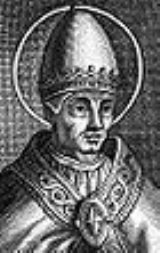
Pope Felix III
Encyclopedia
Pope Saint Felix III was pope
from March 13, 483 to january 3, 492. His repudiation of the Henoticon is considered the beginning of the Acacian schism
.
. He was a widower with two children when he was elected to succeed Pope Simplicius
in 483.
It is said that Felix appeared to one of his descendants, his great-granddaughter Trasilla (an aunt of Pope Gregory I), and asked her to enter Heaven
through death, and on the eve of Christmas
Trasilla died, seeing Jesus Christ beckoning.
and published by Emperor Zeno
with the view of allaying the strife between the Miaphysite Christians and Chalcedonian Christians. He also addressed a letter of remonstrance to Acacius. The latter proved refractory, and sentence of deposition was passed against Acacius.
In his first synod, Felix excommunicated Peter the Fuller
who had assumed the See
of Antioch
against Papal wishes. In 484, Felix also excommunicated Peter Mongus, who had taken the See of Alexandria—an act which brought about a schism between East and West that was not healed until 519.
Felix is often quoted as saying “Not to oppose error is to approve it; and not to defend truth is to suppress it, and, indeed, to neglect to confound evil men—when we can do it—is no less a sin than to encourage them.”
Pope
The Pope is the Bishop of Rome, a position that makes him the leader of the worldwide Catholic Church . In the Catholic Church, the Pope is regarded as the successor of Saint Peter, the Apostle...
from March 13, 483 to january 3, 492. His repudiation of the Henoticon is considered the beginning of the Acacian schism
Acacian schism
The Acacian schism between the Eastern and Western Christian Churches lasted thirty-five years, from 484-519. It resulted from a drift in the leaders of Eastern Christianity toward Monophysitism, and Emperor Zeno's unsuccessful attempt to reconcile the parties with the Henotikon.-Chronology:In the...
.
Biography
Felix was born into a Roman senatorial family and was a great-great-grandfather of Pope Gregory IPope Gregory I
Pope Gregory I , better known in English as Gregory the Great, was pope from 3 September 590 until his death...
. He was a widower with two children when he was elected to succeed Pope Simplicius
Pope Simplicius
Pope Saint Simplicius was Pope from 468 to March 10, 483.He was born in Tivoli, Italy, the son of a citizen named Castinus. Most of what is known of him is derived from the Liber Pontificalis....
in 483.
It is said that Felix appeared to one of his descendants, his great-granddaughter Trasilla (an aunt of Pope Gregory I), and asked her to enter Heaven
Heaven
Heaven, the Heavens or Seven Heavens, is a common religious cosmological or metaphysical term for the physical or transcendent place from which heavenly beings originate, are enthroned or inhabit...
through death, and on the eve of Christmas
Christmas
Christmas or Christmas Day is an annual holiday generally celebrated on December 25 by billions of people around the world. It is a Christian feast that commemorates the birth of Jesus Christ, liturgically closing the Advent season and initiating the season of Christmastide, which lasts twelve days...
Trasilla died, seeing Jesus Christ beckoning.
As Pope
His first act was to repudiate the Henoticon, a deed of union originating with Patriarch Acacius of ConstantinoplePatriarch Acacius of Constantinople
Acacius was the Ecumenical Patriarch of Constantinople from 471 to 489. Acacius was practically the first prelate throughout the Eastern Orthodoxy and renowned for ambitious participation in the Chalcedonian controversy....
and published by Emperor Zeno
Zeno (emperor)
Zeno , originally named Tarasis, was Byzantine Emperor from 474 to 475 and again from 476 to 491. Domestic revolts and religious dissension plagued his reign, which nevertheless succeeded to some extent in foreign issues...
with the view of allaying the strife between the Miaphysite Christians and Chalcedonian Christians. He also addressed a letter of remonstrance to Acacius. The latter proved refractory, and sentence of deposition was passed against Acacius.
In his first synod, Felix excommunicated Peter the Fuller
Peter the Fuller
Peter Fullo was Patriarch of Antioch and Non-Chalcedonian.Peter received his surname from his former trade as a fuller of cloth. Tillemont Peter Fullo ("the Fuller") was Patriarch of Antioch (471–488) and Non-Chalcedonian.Peter received his surname from his former trade as a fuller of cloth....
who had assumed the See
Diocese
A diocese is the district or see under the supervision of a bishop. It is divided into parishes.An archdiocese is more significant than a diocese. An archdiocese is presided over by an archbishop whose see may have or had importance due to size or historical significance...
of Antioch
Antioch
Antioch on the Orontes was an ancient city on the eastern side of the Orontes River. It is near the modern city of Antakya, Turkey.Founded near the end of the 4th century BC by Seleucus I Nicator, one of Alexander the Great's generals, Antioch eventually rivaled Alexandria as the chief city of the...
against Papal wishes. In 484, Felix also excommunicated Peter Mongus, who had taken the See of Alexandria—an act which brought about a schism between East and West that was not healed until 519.
Felix is often quoted as saying “Not to oppose error is to approve it; and not to defend truth is to suppress it, and, indeed, to neglect to confound evil men—when we can do it—is no less a sin than to encourage them.”

